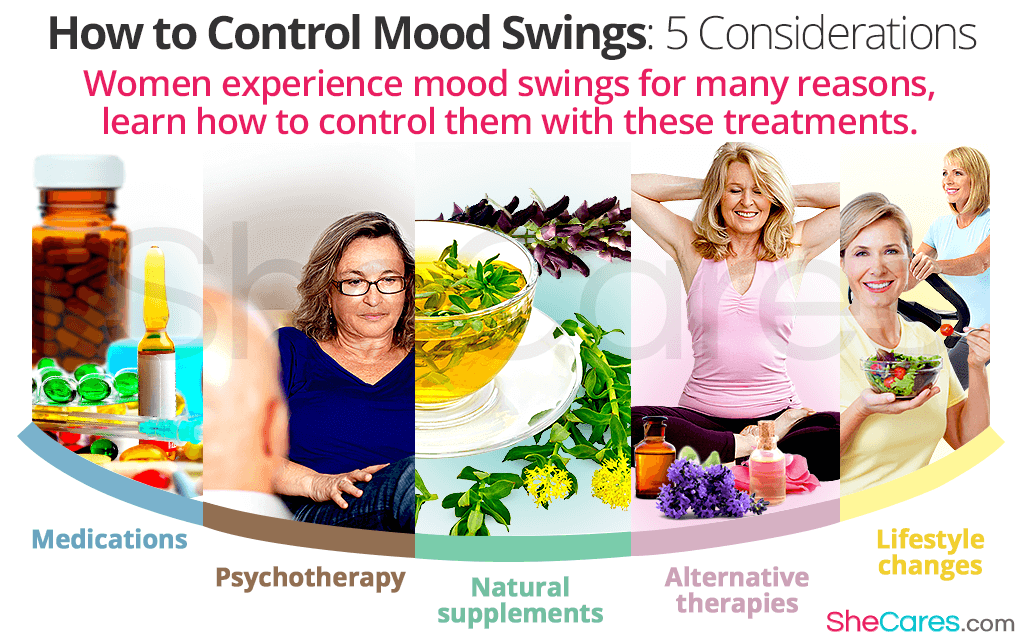Mood swings are a permanent part of being a woman. They can occur as a consequence of certain lifestyle habits, such as alcohol or drugs abuse, overconsumption of caffeine and sugar, poor management of stress, or insufficient sleep. They can also be caused by wide range of medical conditions, such as hormonal imbalance, depression, anxiety, or bipolar disorder. Fortunately, mood swings can be effectively managed. Continue reading to learn about the ways to control mood swings worth considering.
Lifestyle Changes
Diet low in sugar, caffeine, or alcohol, and rich in omega-3 fatty acids, which have been discovered to have mood stabilizing properties, can improve your brain health and make you feel more whole. Regular exercise can enhance your mood due to the release of serotonin, dopamine, and endorphins, and possibly prevent sudden mood swings. Good quality sleep can reduce irritability and make you less prone to mood shifts.
Natural supplements
Several herbal compounds exhibit mood stabilizing properties. For example, herbs, such as thodiola rosea or mucuna can be effective in managing depressive states, while shizandra or winter cherry and kava kava reduce cortisol levels and relieve anxiety and stress.
Other natural supplements might include phytoestrogenic herbs or hormone-regulating supplements that can reduce the occurrence of mood swings by stabilizing your hormones.
Alternative therapies
The following natural therapies can help you keep your mood swings in check by promoting calmness and relaxation:
Meditation, yoga, and breathing exercises can help you focus on the present moment, alleviate stress and worry, and track your mood changes more effectively.
Acupuncture has been found to enhance mood by triggering the release of endorphins, dopamine, and serotonin, and reduce the frequency and severity of mood swings.
Aromatherapy with essential oils, such as lavender, rose, eucalyptus, or melissa, can effectively relieve stress, calm your mind, and promote relaxation, all of which can contribute to managing rapid mood swings.
Ecotherapy has been created based on the belief that contact with nature can improve women's sense of well-being and allow them to perceive their life from a more objective perspective. It has been shown to alleviate the symptoms of mood swings, anxiety, and depression.
Medications
They can be effective in managing mood swings, depending on their underlying cause. They most commonly include:
Mood stabilizers come in three classes: lithium, anticonvulsants, and atypical antipsychotics. They are mainly used to treat various mood disorders, such as bipolar disorder, and schizophrenia.
Anti-depressants are sometimes prescribed to treat mood swings, and while for some women they can bring a relief, in others they might induce manias and depression.
Hormone-replacement therapy (HRT) is used to treat severe mood swings during menopause caused by estrogen imbalance, but carry many serious risk factors.
Psychotherapy
It can be used alone or in addition to medications, and it is very helpful in managing mood swings and building a stronger mind. Three types of psychotherapy used to treat mood swings are:
Cognitive-behavioral therapy (CBT) helps women be more aware of their thought patterns, identify negative thoughts and illusions, which often trigger mood swings, and replace them with more constructive ones.
Mindfulness-based cognitive therapy (MBCT), which is a combination of CBT with mindfulness techniques, has been shown effective in treating mood swings, anxiety, depression, bipolar disorder, panic attacks, and several other mental health issues.
Interpersonal therapy focuses on resolving conflicts in women's family and social relationships, which can trigger mood swings. It also teaches mood swings sufferers effective communication skills.
Untreated mood swings can have detrimental effects on health and lead to risky behavior and even suicide. It is important to undergo regular check-ups to ensure that your brain chemicals and hormones are in balance. Your doctor can also help you decide on medication or supplement treatment that is best for you.
